Epiphany – The Great Revealing
In the time when a corrupt governor ruled like there was no other power in the world, a little boy named Jesus was born in a backwater town. Powerful and important people–the kind who didn’t spend much time with illegitimate children in backwater towns–came looking for him.They went to the big city nearby because they assumed he had to be there and asked the governor where they could find the one who was going to take his place. “We heard that this one is going to be really special,” they said, “and we want to take the time to offer our respects to this one.” When the governor heard that, he was wounded at the thought that he wasn’t important enough and he got scared. “What if it’s true?” he asked himself when nobody was around. So, he asked the men to wait a moment while he talked to his advisers about it.
His advisers checked their books and said, “Oh! They must mean this little passage. I guess it kind of suggests that it will be in Bethlehem.” “But surely, no ruler can be better than you,” they lied to save their necks. So, the governor called for those dignitaries and pumped them for information before telling them to go and look in Bethlehem.
“And if you find him,” he remarked coyly as if he had just now thought of it, “why don’t you come on back and tell me where he is so I can offer my respects, too.” So, the men left the governor’s mansion and went to the little town without a stoplight. They followed the signs that had led them this far and were glad to see the leading coming to an end and the finding finally starting. They arrived at the little shack and wiped their expensive shoes on the rag that passed for a welcome-mat before entering in to find a teenage girl with her child. Somehow–perhaps it had something to do with the long journey–they knew this was the one and they stood in shocked silence before a little boy. Something amazing had been revealed to them–the birth of God in human flesh–and they could not take it in. So, they offered gifts to express their worship and respect: stock options, a bible with his name embossed on the cover, and–perhaps most shocking to his mother–a cemetery plot near the city. As they were leaving, they felt compelled not to return to the governor and so they caught the early flight out.
As they often do, years passed and things changed. The boy grew into a man and grew into his calling.
Jesus’ cousin John had been spending time out in the woods preaching to anybody who would come near enough to hear his frantic yelling. He preached: “Y’all need to get right cause the kingdom of heaven is right around the corner.” He was forever talking about his cousin and how people should pay more attention to Jesus and less to John. John truly was a voice crying in the wilderness: “Get ready for something new from God! Prepare yourselves for God’s appearance.” Of course, it’s no big surprise that people couldn’t stop looking at John. He wore clothes that he had stitched himself that had been made out of fur. He ate bugs and honey (when he could find it). So, he was an oddity and got lots of attention. With the attentive crowds came some people who were listening and were preparing themselves for God’s big thing–God’s Great Revealing.
But attentive crowds aren’t always attentive because they like you or agree with you. Often, John would see some of the members of the local ministerial council hanging out in the crowd and would greet them in his own special way:
“You sons of snakes! Who gave you a clue and told you about the storm that’s brewing–I know you didn’t see it for yourselves. You came out to hear me? Well, get to changing yourself because your name and your reputation aren’t going to do anything for you. Your titles and influence are worthless here. Even now, the chainsaw is gassed up and waiting to be picked up to cut down the trees that don’t produce good fruit. And what do you do with bad wood? You burn it up because it’s useless. I’m out here baptizing with water because of repentance but there’s one coming after me who can do you a sight better–shoot, I’m not even worthy to shine his shoes–and he’ll baptize you in the Holy Spirit and fire. Oh, and don’t kid yourselves…God’s judgment is right around the corner. He’s going to sort out the good from the bad real quick.“
One day, Jesus came to John to be baptized in the creek where John preached. When Jesus took off his shoes and waded in, John shook his head and said, “If anybody should be doing the baptizing it ought to be you and not me.You should baptize me, Jesus.”
But, Jesus smiled and said, “No, John, you’re doing right. This is the way it’s supposed to start. This is the way God’s great revelation begins.” So, John agreed begrudgingly and baptized Jesus in the creek. When Jesus came up out of the water, he looked up and the skies were torn apart before him. The barriers between God and humans had been broken and cast aside and the Spirit of God came down and a voice was heard saying, “This is my boy. I love him and I’m proud of him.”
It was on those two days–the revelation of God to the wise men and at Jesus’ baptism–that we see God choosing to self-reveal to the world. The obstacles have been dismissed and the way has been paved. The paths are being made straight. The Kingdom of God has arrived and is arriving.
Read more from Joshua Hearne at his personal website and the website of Grace and Main Fellowship, the non-traditional community he ministers with.
The Unexpected Gift of Clinton
My coffee was half-cold the first time Clinton Davis sat down.
I was in the Natchez Coffee Company for a favorite pastime: reading, writing, drinking coffee, listening to that acoustic/Hawaiian version of “Somewhere Over the Rainbow,” and hoping that no one interrupted me. For twenty years, I had lived in cities, where I could easily fade into crowds. After two years as a pastor in a small, Mississippi town filled with friendly folks, I began to see that “fading in to the backdrop” wasn’t easy. At the town’s one coffee shop, people would come over to visit.
While I’ve become more open to such interruptions, on that day, I sighed and tensed when a man I barely knew invited himself to the table.
Clinton walked in carrying a stack of catalogs under one arm and a cup of black coffee in the other. I had been introduced to him at a recent party, and we’d had a brief conversation. I don’t remember a lot about that first conversation — except that he talked a lot about being an Episcopalian.
I slipped my white ear buds out to make small talk with him. I thought that when I put the ear buds back in that he would leave. He didn’t. I went on reading and writing and listening to that guy named Israel who sang the Wizard of Oz song. Clinton went on perusing.
For the next few months, Clinton either began following me or developed an excellent taste in food & drink. I chose to believe the latter. I would run into him at my favorite restaurants, and both of us became regulars at the coffee shop. We always conversed, some days more than others, and I discovered that he was well-versed in theology. Truth be told, though, I don’t remember much about those initial conversations with Clinton. I was too preoccupied with something else.
When I met Clinton, I was in my final year of preparation to be ordained as a United Methodist minister. There were forms to complete, essays to write, and deadlines to meet. I had completed the first round of paperwork, and the second round was due at year’s end. I had been excited, focused, and inspired to finish the work into which God led me.
But then, some events happened that caused me to question my calling. I wondered if I really did want to serve as a minister in the Church. I asked myself if I could continue living in the pain and heartache that I was experiencing. While I confided in family and a few close friends my sadnesses, I initially shared with no one the depth of the doubt. I simply held on to the paperwork and wondered if I would mail it after all.
Doubt is a funny thing. I wrote a post about it earlier this year, a reflection on this same, hazy time period in my life. It’s hard to put into words the way that doubt can overpower the mind, the way that it can paralyze you, the way that it can cause you to forget the good because you’re so consumed with the possibility of bad. That’s where I was regarding my call as a minister — when the doorbell rang.
A white, styrofoam “ice chest” was under the mailbox, and the UPS guy yelled “Happy Thanksgiving!” as he drove away (did I mention it was a small town?). The return address was Paula Dean’s then-famous food company. I tore the tape off to reveal a frozen, fully cooked, well-spiced turkey breast. I grabbed the top of the chest to find a note that simply said:
“Blessings on you and your ministry. Happy Thanksgiving from Mr. Clinton Davis.”
Clinton? The theological guy with the catalogs? Sending me a turkey? I guess the turkey was for sale in one of his catalogs…..
I took the turkey inside and showed the card to my parents. We all said variations of “Wow” and “How kind” before I spoke the truth: “He has perfect timing.”
It was on the day of Clinton’s unexpected gift that the fog of doubt slowly began to lift. I held on to the Paula Dean card for a long time with the incentive, “Well, if this person I barely know has faith in my ministry, perhaps I can do this after all.” Before long, though the pain was still present, my vision became clearer. I mailed the last of the ordination paperwork. I threw away the turkey card because I finally believed what it said: God had blessed my ministry, and God had blessed me to do the work of ministry.
With time, Clinton became a dear friend. We began meeting for lunch regularly, instead of just running into each other frequently, with the turn of a few heads. Clinton was almost 80, I was not yet 30, and he had lunch frequently with various female friends. It was a perfect scenario for puzzled, overly-curious onlookers! A bright attorney and academic, he helped me with my sermon research, telling stories about all the places he’d visited in the Holy Land. In return, I tried to help him figure out his cell phone. He eventually learned to send a text message.
Two weeks after I was ordained in 2010, Clinton underwent surgery for a cancer recurrence. Though he recovered from that procedure, the cancer returned earlier this year. He gradually grew weaker, and the treatments no longer worked. He was placed under the care of hospice. I went to see him. I thanked him, again, for the turkey, the card, and his friendship. We talked on the phone after I returned home. He asked what my sermon was going to be, and I told him, “Paradise.” We talked about Jesus’ final conversation with the man crucified next to him, the passage for that upcoming Sunday, and he told me about visiting Calvary. A few minutes before midnight on Christmas Eve, I received word that “light perpetual” had shone on Clinton, and his days on earth were done.
God offers us gifts all the time.
Sometimes we don’t see them. In the two years that passed before I met Clinton, we were likely in the same restaurants often, but I had never noticed him.
Sometimes we don’t expect them. A turkey from an acquaintance was the last thing I would’ve predicted to pierce the darkness of doubt.
When they heard the king, they went; and look, the star they had seen in the east went ahead of them until it stood over the place where the child was. When they saw the star, they were filled with joy. Matthew 2:9-10 (Common English Bible)
How grateful I am that God’s light, shining through the unexpected gift of Clinton, led me to where I needed to be. Where might God’s light be leading you? Through whom might God be leading you? Perhaps it’s time to pay attention to the person sitting right in front of you. I’m glad that I eventually did. And I’m especially grateful that he sat down that day.
all good things to each of you,
Pastor Darian
Read more from Darian Duckworth at her blog.
Not So Silent Night
Preached December 29 at St. Louis Mennonite Fellowship — Matthew 2:13-23
Merry Christmas! It is good to gather together in worship with all of you this Christmas morning. Perhaps it seems odd to speak of Christmas, as our Scripture passage today is in sharp contrast to the celebrations of the past week. On this fifth day of Christmas, we continue to sing of a Silent Night and the stillness in Bethlehem. As we wish for peace on Earth and goodwill to all, we imagine Joseph and Mary and Jesus settling in. New parents, far from home, sleep-deprived, and doing everything within their power to care for this incredibly tiny new person entrusted to their care.
But our text today reminds us that all was not silent. And while Mary might have had a moment to sigh and breathe in the scent of her newborn as she gathered him to her chest . . . that moment did not last long. After all, Mary and Joseph journeyed to Bethlehem because the Roman Emperor wished to register everyone in order to tax them.
The roads are filled with travelers, the guest rooms are packed . . . but no one wants to be there. For many this is unpaid time off combined with costly travel . . . all for the purpose of another tax padding the coffers of a foreign empire.
There is a reason that the people have been waiting and praying for a Messiah to free them from Roman occupation. The New Testament is filled with quiet stories of centurions and legions—indications that the Roman military presence is commonplace, that violent acts of power are ways of life. The hope of a Messiah was couched in what seemed a hopeless situation.
Finally Jesus—God enfleshed—is born in Bethlehem and laid in a manger . . . While Matthew gives us no angels or shepherds, we find a group of astrologers who follow a star and read the signs that a King has been born. At some point during Jesus’s early years these strangers arrive, bearing expensive gifts. Of course, their very journey has stirred political trouble.
And as soon as the astrologers leave, the nightmare begins. Joseph has a dream, and the family runs. Some, likely in an effort to make this passage palatable, talk about this passage as a story of Herod’s fear and the family’s faith. I don’t think there is any level of faith that allows you to wake up from a dream about brutalized babies, pack up your belongings and two-year-old son for a three hundred mile walk and not experience sheer terror. The holy family has become political refugees, leaving everything they know in order to survive. They are making a difficult journey into an unfamiliar place with different customs and different language. They run picturing the sword at every turn.
Herod is certainly acting out of fear—he has a long history of brutal actions used to gain and defend his crown. But while Jesus is protected from slaughter, children back in Bethlehem are not. In Bethlehem, babies are ripped from their mothers and murdered. New Testament scholar Alan Culpepper estimates that somewhere around twenty children were killed that day.
“A voice was heard in Ramah,
wailing and loud lamentation,
Rachel weeping for her children;
She refused to be consoled, because they are no more.”
The Christmas story contains a pain so intense that even those beyond the grave cannot be comforted, because there is simply nothing—nothing—that makes this okay. It is a story of absolute hell thriving on earth. And this is a story that we cannot ignore—that we cannot skip over—because the hope of God is always, always mixed up with the desperate cries of a hurting people.
Rachel is still weeping today. She weeps in Nairobi, where poor parents dress their children as beautifully as they can, and place them in the street, hoping that someone with more resources will want them and take them in.
She weeps across the world as children are taken into slavery, stripped of their innocence, and used in the most vile ways imaginable.
She weeps as families are promised an education and dowry for their girls by factory owners who have no intention of keeping their promises, but merely want cheap labor for clothing sold to us here.
She weeps in Sudan and Gaza and Iraq and Jerusalem, in Myanmar, Thailand, and Guatemala. She weeps in St. Louis as a man named Richard sleeps outside in an alley on Christmas Eve.
She weeps as laws make it harder for the most vulnerable families to meet their basic needs. As guns and bombs and hate tear families and communities apart.
She weeps and cannot be consoled—and neither should we. Our voices should be joining with those experiencing pain and injustice in the world. We are surrounded by darkness—but today we lit the Christ candle, a symbol of God’s presence with us in full faith that the darkness did not and cannot overcome the light. We continue to speak the hope of the Gospel—that God broke into a hurting world and continues to break into the world of our hurt; that Christ came to announce freedom to the captive, release to the prisoner, sight to the blind, life to the lifeless.
A few weeks ago, in anticipation of this day, we shared this light with one another. In doing so, we proclaimed our role—to carry Christ’s light and illuminate the darkness, to join with God in the work of bringing the Kingdom of God here and now.
On this Christmas morning, we are invited to join with the pains of the world, to listen to the stories of anguish, to add our weeping.
At the same time, we are invited to sing—and I’ll admit that I wrestle with this tension. Because it IS tension, and who really wants that at any time of year, much less Christmas? But this is a passage without easy answers, without anything that lets us sigh too deeply with relief.
I believe we are called to sing, not in ignorance of a hurting world, but because the light of God, the love of God, is bursting forth. God wasn’t just in Egypt, but God was also in Bethlehem, holding mother and father and baby—and even soldier—in all of their brokenness. God is here today, entering into our world and our lives in new ways. God with us . . . God. Is. With. Us.
Read more from Jennifer Harris Dault at her blog.
Isaac’s Advent Series: Week 3 (Signs of His Presence)
I used to have a really clean house.
On Saturday mornings, I would put my podcast-filled MP3 player on the speakers and set to work vacuuming, dusting, mopping, wiping, and spinning the washing machine. It was hard to get the whole place spotless, but it usually did shine by Saturday night.
Then, Hurricane Isaac blew through town, along with a labrador-Eskimo-collie. My house will rarely be as clean as it used to be–especially the red couch.
The red couch is my favorite piece of furniture that I got as a graduate student. It survived theological studies, a move to the Mississippi River, and this recent trek to the delta. When I once talked about parting with it, some of my friends looked at me as if I were giving away one of their right arms. Its seats are well-worn, but the brightness has not faded.
Now, it has become a white-speckled couch.
My two-legged friends are not the only protectors of the red couch. Isaac has made himself chief protector, and his love for it is obvious to the eye. When he sheds, his short white hairs stick all over the fabric. At first, I had it all under control. Of course I would keep my house as clean as it was pre-Isaac. I would keep the red couch hair-free by covering it with blankets and sheets. The sheets would catch his hair and keep it from sticking in the cushions.
I was right for 12 hours–the time that it took for Isaac to figure out how to remove the sheets, throw them on the floor, and snuggle into the red cushion.
Of course, I still had it under control with a plan B. I would clean the couch every night with a lint brush. Twenty sheets of sticky paper later, the couch seemed to have no less white than before. My arms were sore from rolling the lint brush back and forth and back and forth.
But I still had it under control! Wal-Mart had a sale on handheld vacuums with a rechargeable battery. After one cushion, I was leaping for joy. It was hair free and bright red again! Then, halfway through the second cushion, it puttered to silence. There had been so much hair on the first cushion that the battery power was already out.
Did I really have the white hair under control? Well, yes, and how could anyone think otherwise? I bought a special comb, made especially for getting pet hair off of furniture. I would comb and comb and the white hair into piles, then run the handheld vacuum quickly, before the battery ran out.
Then, the comb fell apart.
Okay. Maybe, just maybe, I admitted that I was powerless over the shedding of Isaac’s white hair on the red couch, and my life had become unmanageable.
Insights from Isaac, and all of God’s creatures, usually arise when I finally practice acceptance. That’s when I can finally hear God saying what He was probably trying to say back when I put the sheets on the couch.
A broken “couch comb” in my hand and a dead vacuum in my lap, I sunk into the familiar red cushion and sighed. Isaac jumped next to me and shook his whole body in joy before lying next to me. Hair spun like snow off of him and settled on me, the couch, the vacuum, and the comb. And for the first time, it was okay with me.
Pet hair on a piece of furniture or a corner of the room tells us that our furry friends have been present. Even when I don’t see Isaac lying on the red couch, his white hairs are a sign that he had been there. Even when he is absent from the cushions, he is present in the snowy trail he left behind.
During Advent, we wait for God to be with us. We do not see with our eyes the face that Mary saw in the manger. We do not hear the same angel’s voice that the shepherds heard. We do not smell the honey-coated locusts of John the Baptist (unless you’re whipping up some unusual recipes for Christmas gifts). Yet, we are surrounded by signs of God’s presence — indicators that he has come and is coming again. Think of the songs we sing each Advent and Christmas. Think of the faces of children when the lights on a tree are turned on. Think of the brush of your arm against another’s as you hand them a gift, perhaps the only one they will receive this Christmas. God is with us in the trail of white-haired love, joy, and peace that we find in each other–and in worshipping him.
In John 14:9, Jesus says to his confused friend, Phillip, “Anyone who has seen Me has seen the Father.” When we see signs of Jesus in one another, we see Emmanuel. When we see Emmanuel, we see our Heavenly Father with us. When we stop to see the white hairs, we see that they are signs of love that come from God. May the remaining week of Advent bring us such signs, and may we stop to see and hear and taste and feel and smell those signs. May we savor them. May we be covered in them.
all good things to each of you,
Pastor Darian & and Paw-stor Isaac
Addendum: I received a remarkable vacuum cleaner for my birthday that actually does make the red couch red again with little effort. I use it weekly. Otherwise, I take time to enjoy the white hairs.
Read more from Darian Duckworth at her blog.
It’s in the grief basket
My father-in-law passed away on December 4. While he had been ill for some time, we did not expect him to pass so soon. Under the care of remarkable hospice and hospital staff, he died shortly after 7:00 am. The next few hours were filled with tears, hugs, phone calls, the kindness of our ministers and a bag of Egg McMuffins. With our iPhone batteries failing, we returned home from the hospital early that afternoon.
Sitting on our front porch was a large, wrapped basket.
The basket is part of the ministry of our church. A group of women who call themselves “Partners in Missions” (we just say “PIM”) assemble the grief baskets. I’m told that they keep around six on hand. My wife, Rejeana, is part of PIM. She stared at the porch and commented that she never considered we might one day be the recipient of one of the grief baskets she helped prepare.
I didn’t pay any attention to the basket and had no clue what it contained. There were many things to do — it is amazing the things that have to be done ahead of a funeral.
The next day, we were still reeling from the shock of the loss, and realized we were going to have guests dropping by. People from church were bringing cakes, soups, sandwiches and other goodies, and relatives were traveling in ahead of the funeral. Our house was selected as the family hub. So naturally I started a grocery list… “honey, we’re nearly out of toilet paper. I’ll go to the store and get some.”
Rejeana was across the house and yelled, “no need – it’s in the grief basket.”
Sure enough, there were several rolls of toilet paper (and they were good quality, not that thin stuff found in hotel bathrooms). A couple of hours later I went to make a pot of coffee and noticed we were were low on coffee and creamer. “I’m still gonna have to make a store run — we need coffee and creamer,” I told Rejeana. She just grinned and said, “nope, it’s in the grief basket.” Sure enough, a bag of Starbucks Sumatra dark roast (yummy) and Coffee Mate creamer were in the basket, along with various sweetners, paper plates, cups, plastic utensils and much more.
Over the next few days we received many guests, welcomed relatives, and shared tasty meals gifted to us by members of Highland Hills Baptist Church and Rejeana’s coworkers at Wesleyan College. If we found ourselves needing anything, a chorus of voices would proclaim, “it’s in the grief basket!”
We all experience loss and grief at some point in our lives. There’s little that can be said to help the pain. But with time, the comfort of family, church and friends — and a grief basket, we experience God’s grace and care, and it is enough.
The Gospel According To Paul Thorn (Again): Loving What We Don’t Like
Since my dad discovered his music in 2007, Paul Thorn has been one of my favorite theologians. Songs like “800 Pound Jesus” remind me of the unfailing friendship of Jesus Christ, “a bigger man than you or me.” I like to study the story of Pentecost in Acts alongside “Mission Temple Fireworks Stand” and its Holy Spirit fire. I wrote a blog post last year about his song, “I Hope I’m Doing This Right”–a favorite prayer of mine. Paul Thorn’s songs are honest, real, and creative. They always make me think. Usually, they make me laugh, too.
One of the greatest laughs from Thorn came to me while driving eastbound on barren Highway 84, a south Mississippi road peppered with Apostolic and Baptist churches. My destination was a pot of coffee, round tables, and a mandatory gathering of preachers. The sixty-mile drive with nothing but music as my passenger was exactly what I needed on that fall day. Little did I know that a theology lesson would come between the towns of Roxie and Bude.
“Here’s some new music from Paul Thorn.”
The deejay’s announcement found me fumbling to turn up the volume.
My family reunion is going on today
My relatives have all flown in from places far away
As we sit there eatin’ chicken, it hits me like a truck:
I don’t like half the folks I love. *
I don’t know what I was expecting Paul Thorn to say, but it wasn’t that. I laughed and slapped the steering wheel. He went on to sing about how difficult people can be, especially family members. No matter how much we dislike each other’s actions, we can’t help but love each other.
The book of Genesis reminds us of how complicated families can be: jealousy between siblings, arguments over land, a conniving father-in-law, deception around inheritance, sisters vying for a man’s attention, etc. And this is Jesus’ family! His ancestors were one, big, dysfunctional family who didn’t really like half the folks they loved. Why would God choose to join the mess of a family?
There are many ways to answer that question. Perhaps one is that God wants for all of us to become his family.
In God’s family, the body of Christ, we aren’t always going to like each other either. Fires of conflict will start, and some will burn out. We’ll disagree and let each other down. No matter what we dislike, we are still called to love. A question I often hear is one with which many of us struggle: how do we love someone who has wronged or betrayed us?
That’s a love that only Jesus Christ can put into us and demonstrate through us. It’s a love we can only give to each other after we’ve received it from God. Even with his love working through us, the struggle to like each other will still be present.
In this world we live in
This I guarantee:
We all need more tolerance
To get along peacefully.
But I’m not as nice as Jesus.
And I really am fed up.
I don’t like half the folks I love.*
Perhaps loving begins with accepting the fact that we’ll always struggle with “liking.” Perhaps we’ll love best when we admit to God that we need help with the loving. Perhaps we’ll realize that no matter how much we hurt each other, at the core of our being is a desire to love and to be loved. Let’s start by receiving God’s love through Jesus Christ. Let’s take time to laugh at how far short we all fall of “being as nice as Jesus.” Let’s try to love, even when we don’t like it!
all good things to each of you,
Pastor Darian
* “I Don’t Like Half the Folks I Love” is on Paul Thorn’s album, Pimps and Preachers. Yep, that’s the album title. You can find the complete lyrics at this link. To read more about Thorn, order his music, or view his artwork, visit www.paulthorn.com
Read more from Darian Duckworth at her blog.
Obadiah, Prophet, Soldier, Writer
“Be quiet. You can hide here but only if we can keep it secret. You need to remember that we’ll all be killed if they find out what we’re doing.”Obadiah closed secret entrance to the cave after raising his finger to his lips to indicate the silence he hoped for. Then, he walked a few hundred feet to the entrance of the other cave and repeated himself to another group of prophets. Obadiah was a servant of Ahab and Jezebel but could not follow through with their orders to have the prophets killed. He had remained loyal to the God of Abraham, Isaac, and Jacob even when it seemed the rest of his people and peers had turned their backs on their heritage in favor of the illusion of power and sophistication.
Worship of Baal was widespread through Israel yet Obadiah continued to worship the one God of Israel. The only major difference now was that he had to do it in secret most of the time. Obadiah had hidden prophets in caves so that Jezebel might not find them and slaughter them.He had split the groups into two smaller groups so that they could be hidden in separate caves. This way, if one cave was discovered and raided, the prophets in the other cave could escape quickly and some of them might be saved from Jezebel’s bloody hands.
Eventually, Ahab and Jezebel grew tired of the prophet Elijah who resisted them and seemed untouchable. They gathered up three detachments of soldiers and sent them out to arrest Elijah and bring him back to answer their questions. Obadiah was one of the soldier leaders who led the third detachment of soldiers. The three groups went off to do the dirty work of the idolatrous rulers and seize God’s prophet. As the first detachment approached Elijah, they noticed that he did not seem prepared to resist them. Instead, they found him kneeling and wordlessly moving his lips in prayer. As they approached–calling out to him loudly with mockery in their voices–fire consumed them as if it had fallen from the sky.With more hesitation, the second detachment continued their advance on Elijah and soon fell to the same fate of incineration. As Obadiah’s detachment approached, Obadiah offered his own prayers and was surprised to see that the same fate did not befall the frightened group of soldiers. “All of you have been spared,” shouted Elijah as he pointed at Obadiah, “because of this man’s devotion to the one true God of Israel.”
Obadiah and Elijah shared the Faith with the soldiers and as they were preparing to return to Ahab and Jezebel empty handed they were surprised to see that Obadiah was removing his weapons and armor.”Take these back with you and give them to Ahab and Jezebel,” he said, “I shall serve them no longer.” They did as he requested and Obadiah stayed with Elijah to learn more about the life of a prophet. He felt a strong calling to speak truth in a powerful way regardless of cost or threat. He became a prophet to Edom and prophesied of a coming day of judgment for all nations. Before he died, or perhaps shortly thereafter, some of his words were recorded. It was Obadiah who said, “For the day of the LORD is near upon all the nations. As you have done, it shall be done to you; your deeds shall return on your own head.” The man who had remained faithful even in the face of great threat and danger called all people to remember God’s justice and judgment even before it became so powerfully apparent.
Read more from Joshua Hearne at his personal website and the website of Grace and Main Fellowship, the non-traditional community he ministers with.
the wizard + the curtain
Throughout my life I’ve had a fairly active imagination.
Up until the age of 7 or so, I was a rugged-individualist when it came to making my own rules about life, love, micro-machine floor placement, and which Disney soundtrack* would play in the background of my costumed parades through my parents’ suburban rancher.
And yes, the long hallways do provide excellent cat-walk space.
(*NOTE: a particular favorite was the Robin Williams-voiced “Prince Ali Fanfare” from the Aladdin soundtrack. My matching Arabian Nights-themed-pajamas cast a striking figure, even for a pudgy 2nd grader.)
But then my brother entered the picture, and ultimately forced a significant change in my formerly-unashamed air-guitar-solos laid brilliantly over Bruce Hornsby’s Scenes from the Southside played at room-clearing-volumes.
For the Record: 2PAC SAMPLED THIS MAN’S WORK
(casually brushes haters off)
No longer would I be able to shamelessly-with-2-fists-raised-in-the-air-celebrate my last second lay-up finally pushing the perennially basement dwelling Tennessee men’s basketball team of the 90s to the sweet 16 (rather than the finals, I was a whimsical middle schooler, not a crazy person), without first looking over my shoulder to make sure my brother hadn’t invited any of his friends over.
It only took a few red-faced encounters with those outside the family to tone down my outbursts, in favor of a more, let’s say, publicly reserved tenor towards the world.
Even now, my imagination still manages to express itself in fits and starts, but outside of stubbornly leading me to believe that Tennessee football will one day reclaim the glory of the late 90s or that grad school is at some point going to solve any of my financial or occupational aspirations, it has laid, for the most part, quite dormant.
Because, if there’s one thing we pick up over the course of our shared existences on this Earth, it’s that folks who spend the majority of their time staring dreamily out of windows are unbearable, bypass calculus, ultimately end up living long term in their parents’ basements, and never amount to anything.
Leaving many of us who were altogether not enticed by that description, to keep our heads buried in TPS reports and marketing meetings, until one day we become the very ones giving the speeches bemoaning the indolence of youth from the soapboxes of our brimming 401k’s and kid-picture-plastered-cubicles.
That’s the thing about our imaginations, much like old treadmills hiding in the corners of our grandparents’ wood-paneled Rec-rooms, the less we use them the more they turn into drying racks and long term cobweb storage facilities.
Which, however unexpectedly, reminds me of one of my least favorite movies:
An important caveat before we continue:
No, even for someone who once listened to Phil Collins’ Tarzan album for the entirety of a 12 hour road trip to Orlando, I do not have enough je ne se qua for a seemingly endless movie where people vanquish a witch with a pail of dirty mop water and burst into song about their wavering abilities to follow a clearly marked trail.
However,
my favorite moment of my least favorite film is when the Dorothy-led band of witch-murderers returns to Oz to face the great and powerful wizard, and demand the promised bounty for their efforts.
During an argument over whether or not the Wizard is able to grant their requests, Toto, the dog, saunters over to a mysterious green shower curtain in the corner of the room, and pulls it back revealing a mustachioed, heavy-set banker turning knobs, pulling levers, and shouting into a voice amplifier.
Needless to say, the characters are a bit taken aback at the discovery that the giant green head in whom they had placed unending trust and risked their lives for was in fact not a wizard at all, but rather just an old white man with a sagging waistline.
“Pay no attention to the man behind the curtain.”
For much of my life this has been my experience with the Christian faith greeting me each Sunday (with greater and lesser degrees of effectiveness). Lots of lights and smoke and mirrors and guitars and dry-ice and lasers and requests from aging white men in straining dockers to “pay no attention to the man behind the curtain”.
Leaving us asking time and again: “just so we’re clear, showing up for this, weekly, is the height of human existence?”
At a certain point there’s only so many curtains one can pull back on life before questioning the authenticity of every experience, every moment, every prayer, every song, and even every well-placed HD quality Invisible Children video set to Mumford & Sons
In short, for many of us at least: we’ve seen too many white dudes back there.
What we can’t see or touch or feel or see or taste or hear quickly becomes that of which we must, thanks to years of disappointment and irrelevance, remain skeptical.
In the Gospel of Matthew, the author mentions an oft-overlooked detail accompanying Jesus’ tragic execution about another curtain and another unexpected discovery:
“And when Jesus had cried out again in a loud voice, he gave up his spirit. At that moment the curtain of the temple was torn in two from top to bottom.”
Leaving behind, what I can only assume, was the quite startling image of nothing staring them squarely in the face. And, just a few days later, Jesus manages to deliver a similar greeting to his closest followers expecting to find his body slowly decaying in a dark tomb:
No sermon.
No answer.
No levers or pulleys or even heavy-set bankers
Nothing, once again, was the only thing on the other side of the stone covering the entrance to his grave.
The one thing keeping me tethered to this faith, even after the exhausting inauthenticity, the failures, the pain, the cheese, the abuse, the music, the embarrassment, the movies (OH, THE MOVIES!) and all the ways organizations and individuals have sullied the name of the divine throughout the history of this thing we call “Church,”
is the quiet absence greeting me behind the torn curtain and the empty tomb.
It’s the void that refuses to be filled in with explanations, and answers, and music, and sermons, and politicians, and government shutdowns, and bumper stickers, and jihads, reminding me that it’s only in the absence of an answer to my prayers that I eventually discover I’m it.
And just like our imaginations, the more we come alive to this truth, this way of seeing, this way of living in the world, the more we come to know the quiet reassurance of its unobtrusive consistency in our lives.
Because, just like that witch-murdering band of misfits, the courage you long for, the beauty you seek, and the compassion you desire, resides not in lightning bolts or wizards or the rise of indie arena folk, but deep in your own weary bones.
So may your sentences remain unfinished and your questions unanswered.
May your road be windy and your certainty dashed.
And lastly, may your void, your “god-shaped-hole,” or whatever it was termed in youth rooms of both ancient and recent past, may it remain empty. Leaving enough empty space for your imagination to join the unexpected heights of a God who always manages to escape the assurances of our truth and the shackles of our expectations.
To read more from Eric Minton at his blog.
The Burden of Faith
A Sermon Presented to St. Charles Avenue Baptist Church
My sermon a few weeks ago concerning faith mainly looked at our faith in terms of hope in God. Even then, I knew the sermon had a second part, but I wasn’t really sure what it was.
During the night one night, as I lay in bed watching the clock move through the 4 AM hour, I found myself in circular conversation with God. Frustrated by my inability to go back to sleep and my need to wrap up the conversation, I heard myself say, “Faith is a burden.” Struck by my own statement, I entered into a new circle—Is that true? Is faith burdensome? I felt a little blasphemous in even thinking about faith that way.
A lot of my 4 AM conversations seem meaningless the next day or the questions I ask are easily answered after the sun comes up, but the thought of faith being a burden has stuck with me for weeks. I keep hearing the verse, “take up your cross and follow me,” echoing in my ears.
I also have been repeatedly drawn to the part of Moses’ narrative in Exodus that begins with the scene at the burning bush. Old Moses, out shepherding his father-in-law’s flock, sees something that piques his interest. Clinging to his staff, his only means of protection, he walks over and is commanded to take off his shoes. “You are on holy ground in this wilderness, take the sandals off your feet.” Hearing God’s voice, Moses hides his face, afraid to look at God.
God tells Moses of his plan to set the Israelites free and Moses starts to tell God why he isn’t the man for the job. “God, I am no one, I have killed a man, I am a stutterer, I am in charge of my father-in-law’s flock, I have a family…”
And God answers, “Moses, you may have your share of burdens, but I am now going to ask you to throw down that staff that is currently holding you up.”
We hold on to burdens that have us ashamed, afraid to look to God; we hold burdens that leave us heavy laden and run down; we hold onto burdens that we could have thrown down long ago, but we hold onto them because they have become crutches for us and we are afraid to put them down because we are afraid that we might fall down.
Think of the illustration from today’s Gospel story (Luke 18:9-14):
Two men went to the temple to pray. The tax collector, standing far off, would not even look up to heaven, but was beating his breast and saying, ‘God, be merciful to me, a sinner!’
God beckons us to come before Him just as the tax collector, humbly, with our shoes off, acknowledging holy ground, and to lay down our burdens right there in His presence, to lay down the staffs that we think are holding us up. Jesus says to us, “Come to me, all you that are weary and are carrying heavy burdens, and I will give you rest” (Matthew 11:28).
The Lord said to Moses, ‘What is that in your hand?’ Moses said, ‘A staff.’ And God said, ‘Throw it on the ground.’
—————–
That’s not the end of the story is it? Moses doesn’t get to throw down those burdens and walk away, does he?
The next part of the story begins with a snake on the ground and with God telling Moses to pick that snake up.
The Moses narrative says nothing about how quickly Moses picked up his staff. If he took a little time, I can’t say that I would blame him. Though I gave no real thought to that staff turning into a snake, if it did, I would be hoping that Tom had a net and was willing to use it.
The fact is that the next part of the story is an acceptance of a mission. The next part of the story signifies the beginning of a new journey—out of the shelter the wilderness provides and into the open action—this is where faith and works collide. This is where I hear the words we read earlier from James and this is where I hear Jesus’ words, “Take up your cross and follow me.”
When we pick up our staffs, our crosses, and in doing so accept the mission of the cross of Christ, we are accepting the collision of our faith in Jesus and the works of Jesus. We may already have the distressing voice with us that won’t let us sleep because of theological questions. The voice may keep us coming back to church, it may keep us tithing, it may urge us to walk over to a burning bush, and it may even oblige us to pass along a package of peanut butter and crackers to the fellow on the street corner.
But we mustn’t confuse being good humans with being followers of Christ. When we truly accept the burden of the cross of Christ, we are accepting the vision that compels us to see injustice, poverty, and inequality, the action that compels us to fight for freedom, to feed the hungry, and to forge a redistribution of power, and we acknowledge that it is the love of Jesus that compels us to see, to act, and to share.
Jesus beckons us to come before him, to pick up our cross, and to accept the burden of faith.
—————–
But that’s not the end of the story, is it? Moses’ journey is just beginning and it is not an easy journey. The trip to Egypt, in Egypt, and out of Egypt is horrific. And then Moses gets stuck in the wilderness with a people whose satisfaction is always short-lived. We hear these people in the wilderness ask time an time again if God has forgotten them—they lose faith during the journey.
What of our mission, of our ministry? What of those days when our good works feel worthless or painfully perpetual? What of those days when we do good works but we find our faith weakened? Come on James! We’ve got works and we’ve got faith, but there are some days when we’re not sure that we believe.
Several nights ago, as I lay in the bed with my daughter Annie, we sang “Jesus Loves Me” together because she’d be singing it since I picked her up from preschool. At the end of the song I said, rather offhandedly to her, “Jesus does love you, Annie.” Her reply, “I know. Mr. Stephen tells me that.”
All at once, I sighed with relief and felt a pang in my gut. I was relieved that she was hearing about Jesus’ love for her at school and I was hurt at the possibility that she didn’t know this from me, her mother. Her mother, a minister.
The roll of questions started to flood: “Was my ministry becoming a job and was I no longer willing to bring work home? Was my faith wavering enough that I was failing to share the faith with my own daughter?”
Here’s the answers: Maybe and maybe and I don’t know. I don’t have any answers. I’m willing to accept that I get tired and I’m willing to accept that I do share the message of Jesus with my children, and that Annie, in that occasion, was just relaying a simple fact from her day at school.
But I share the more painful possibilities of that story with you because I believe that I am more human than unique—I don’t think that I’m alone. I think that I sing in unison with many the words, “Prone to wander, Lord, I feel it, prone to leave the God I love.”
Hear this heart-wrenching quote from Mother Teresa: “Jesus has a very special love for you. As for me, the silence and the emptiness is so great that I look and do not see, listen and do not hear.”
I find consolation in the fact that others struggle, even those saints like Mother Teresa. I find consolation in the fact that it felt good that night to sing “Jesus Loves Me” with my child. I find consolation in the fact that I often feel burdened by faith; burden can sometimes mean recognition of and reaction to the lack of one’s own understanding. And realizing that we don’t know it all is, in itself, a push to do more and a release from having to know it all.
On those nights when I have circular conversations and I just want to go back to sleep, I am consoled in the morning because something has been going on—I am wrestling, I am struggling, but at least there is action.
I don’t believe that my journey of faith or our journey in faith is supposed to be easy. If we have a solely rosy interpretation of scripture, then I don’t think we’ve been presented with the whole text. In life, I believe that we will hurt and be hurt. I believe that we will feel overburdened and that sometimes those burdens will be too much. I believe that on occasion we will do good works and they won’t be received well or we will do good works for the wrong reasons. I believe that there will be days and nights and weeks or longer that we will strain to hear the voice of God and we will not be successful. And we will grieve.
These words are no benediction, are they?
Go ahead and argue with God. Pray. Cry during the struggles. Pray again. Keep doing good works! Be open to the possibility of joy every morning. And when you find it, share it abundantly. Love abundantly. Pray to the one who receives your burdens and cast those burdens before the Lord. You will be sustained. This is not the end of the story.
Read more from Stephanie Little Coyne at her blog.
The Candid Clergywoman: When The Pastor Hides — And Cries
Dearly Beloved Readers: I’m amazed that out of the different blog entries I post, the ones that receive the most readers & feedback are those entitled “The Candid Clergywoman.” These are the most vulnerable of my posts. In them, I try to share as honestly from the heart as the computer keys will allow. If I’m going to be completely “honest,” I don’t like to write them. It’s a lot easier to tell you what my dog did last week or which yoga pose taught me about God!
Some days, however, I feel the Spirit “nudging” me to do what I don’t want to do: write candidly about life as a pastor, both the joys and the hurts. Today is one of those days. Thank you for reading & listening with me.
“We’re praying for you.”
I was robed and walking towards the narthex when one of my church members stopped to hug me and whisper these words. I offered a broken “thank you.” He walked on. I felt the tears grow & burn in my eyes. Halfway down the hallway, I turned around and ran back to my office. By the time I got there, I was sobbing. The clock read 10:24AM. Six minutes until worship began, and I was grateful that I gave up make-up, especially mascara, years ago.
I need to get it together, I thought. What if we have first-time visitors? I should go meet them. Are there any announcements I need to make? Why do we buy such cheap, generic kleenex in churches? I could really use some of those with lotion right now.
I took a deep breath and looked in the office mirror. If I could just get the water out of my eyes, surely no one would see the dark circles underneath. I fluffed my hair–not because it dried my eyes but because it made me feel a little better.
I put my hand on the door knob, only to feel the tears rise again. Darn. I took another deep breath, eyes closed, and I could hear those words again…
“We’re praying for you.”
Standing in the dark doorway of a church office, I let those words wash over me. Church members were praying for me. If there were visitors, the church members would greet them. If there were announcements, a church member could voice them. All I needed to do was show up. I was weak, but God was strong. The church’s spiritual leader was weak, but the Church was strong.
I finally emerged and headed back down the hallway at 10:28. The choir was lining up, and I was able to slip into my spot quietly. A couple of people shared prayer requests with me, and I was able to listen dry-eyed. The organist and pianist began the prelude, and we processed in. Everything went as usual, and I was even able to lead the Prayers of the People with a genuine smile. Just before I was to stand for the Scripture reading and sermon, the part about which I was most nervous, the soloist stepped forward. When I heard the first notes of her guitar, the tears started again.
The song was called, “Grace For the Moment.”
I glanced at the congregation to see tears on many cheeks, not just mine. Whether saint or sinner, pastor or parishioner, we share this in common: we all need grace for each moment. Though I had been physically alone in that office only thirty minutes earlier, I was far from lonely. The majority of people in that sanctuary did not even know that I’d been crying, much less why. I did not know why many of them were crying that day, either. Our tears revealed that we needed and wanted the grace that God was pouring into us through worship and prayer. When the final strums of the guitar faded, the moment when I most needed grace arrived. I stepped into the pulpit, quietly thanked her, and invited everyone to turn to the Scripture lesson.
I had walked into church that day with a heart broken by a break-up. While I had the title of “pastor,” the people of St. Luke United Methodist Church were my pastor. I may be a worship “leader,” but what led me into God’s presence were the prayers and songs of God’s people. When I left that day, my heart was not fully healed, but it was closer to being whole again. My eyes were red and raw from cheap kleenex, but God’s presence, with God’s people, was the lotion that I needed to ease the pain.
all good things to each of you,
Pastor Darian
Read more from Darian Duckworth at her blog.

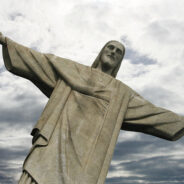

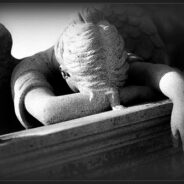


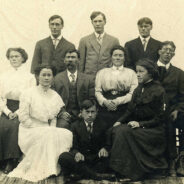
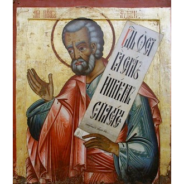

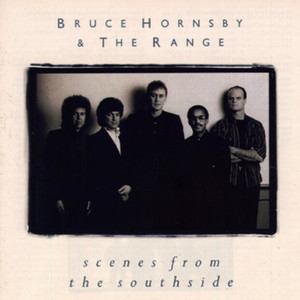


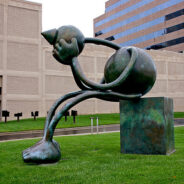
Follow Us!